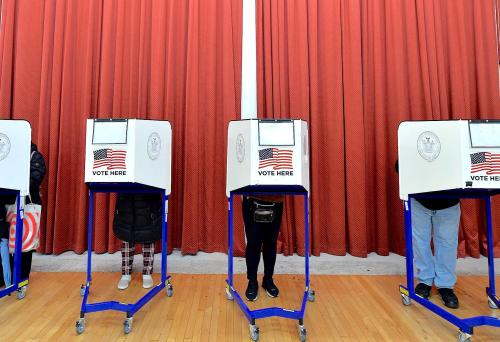In the Brookings Cafeteria Podcast released on Friday, Fred Dews interviews Senior Fellow Thomas Mann about how he got his start in Washington, current dysfunction in politics, and what the future holds for 2016.
Mann talks about how his interest in politics began at his family’s dinner table growing up. He remembers his father as an “inveterate consumer of political information, who believed in the importance of politics and government.” In college, Mann picked up an interest in politics, which eventually led to a PhD in political science. Mann then moved to Washington, enjoying the up-close experience of politics, while continuing to work on disinterested, academic work. Dews and Mann continue on to discuss some of the fundamental issues facing the American political system today.
On Political Polarization
“The Republicans have become like a parliamentary party – vehemently oppositional to anything that the other party might do. In a parliamentary system, the minority’s opposition – even staunch opposition – has little effect on the actual business of governing, and that’s the fundamental difference…Right now, when the parties are so distant from one another, when they are engaged in this competitive gain for control of the majority, you don’t see that kind of bargaining and negotiation. And yet our system can’t work without it.”
On Gerrymandering, and Money in Politics
“The worry about money [in politics] is that the huge increase in the amount of economic inequality…runs the risk of creating more political inequality. We believe in one person, one vote and every citizen has the right to vote, but in fact there are more resources in the top 1 percent or the top 0.1 percent that are dedicated to politics than tens of millions of other Americans. Over time that is certainly worrisome and deserves attention. It is a separate problem from extreme partisan polarization, but it reinforces polarization nonetheless.”
On Voting and Voter Turnout
“One possible reform, that is perhaps the most controversial, is mandatory attendance at the polls like Australia and a dozen other countries have. …This greatly increases the size of the electorate and it means political parties and candidates have no incentive to spend huge amounts of money to turn out their money and demobilize the other voters. That is, there is a fight over the nature and size of the electorate that takes precedence over any kind of disagreement about issue or appeal to people that are less ideological and less politicized.”
Also in this week’s podcast, John Hudak updates us on what’s going on in Congress. Republicans are irate after Obama’s speech on immigration last night, calling his unilateral action unconstitutional. As Hudak points out, presidents have pretty broad discretion when enforcing laws. Nevertheless, there will likely be a response from Congress—potentially in the form of a lawsuit—but Congress may also try to defund agencies or block other legislation in response to the president’s action. Ultimately, however, the definitive answer on the legality of Obama’s actions would need to come from the courts.
Listen to the full podcast below:
p>



Commentary
Thomas Mann Reflects on Politics and Polarization in Washington
November 24, 2014